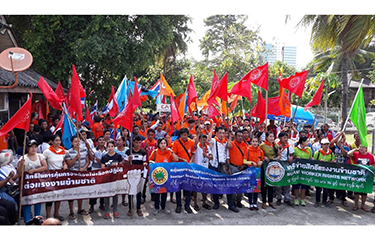Labor unions emerge as voice for migrant fishermen in Southeast Asia

Despite legal and corporate barriers, trade unions are starting to give migrant seafood workers a greater voice in Thailand and across Southeast Asia – enabling them to combat the subpar working conditions that persist on fishing vessels and in seafood processing facilities.
Organizing hasn’t been easy, according to a new report published by the International Labor Rights Forum (ILRF), an advocacy organization. The migrant workers that fill most of the low-wage, low-skill jobs in the Thai seafood industry are legally barred from forming labor unions in Thailand.
The ILRF is urging the Thai government to reform labor law to allow people of any nationality to form unions, while calling on buyers to pressure the Thai government on labor reforms – and guarantee rights to freedom of association and collective bargaining.
"The restriction of such rights appears to be a major reason for the continuing of forced labor of migrant workers in Thailand and other countries," ILRF Senior Seafood Campaign Coordinator and report author Kimberly Rogovin said during a webinar announcing the new report.
Despite the restrictions, migrant workers are beginning to organize anyway.
In 2017, the Fishers’ Rights Network was established, and today represents more than 2,000 migrant fishermen in Thailand, advocating for better working conditions with both major seafood companies and government agencies. The union has distributed medicine and first aid kits on vessels, compelled employers to provide salaries and benefits, and convinced the government to raise the minimum wage for fishermen, according to ILRF.
Workers have also formed the Seafood Workers’ Group by organizing five seafood processing factories in one province in Thailand. In another Thai province, Cambodian fishermen and their wives created the Samae San Fishermen’s Alliance.
But not all organizing efforts have proven successful. Two-thousand workers employed by the tuna processor Unicord and organized by the Migrant Workers Rights Network achieved little when they demanded better employee benefits in 2017.
Fundamentally, forced labor arises from steep power imbalances between workers and employers, and exists on a continuum, from routine labor law violations such as withholding documents to severe forced labor conditions such as captivity. Labor unions give workers more power by amplifying workers' voices.
But in Thailand, labor unions are especially weak, across sectors: 75 percent of the country's 38 million workers are not guaranteed full rights of freedom of association and only 1.6 percent of workers are unionized.
About 10 percent of workers in Thailand – and the majority of seafood workers – are migrants from other Southeast Asian nations. Hundreds of thousands of migrant workers have met the demand for cheap labor in Thailand as the country has risen as a global seafood industry leader.
These seafood workers need a democratic union built by them and for them so they can assert their voice among governments, large corporations, NGOs, and law enforcement, according to Fishers’ Rights Network Organizing Director Ussama Kaewpradap.
"We are building power from the ground up, fisher by fisher, conversation by conversation, meeting by meeting," Kaewpradap said during the webinar. "Fishers are still facing many significant labor rights violations. Most do not have a copy of their own labor contract in their own language. They're not paid monthly, according to Thai law."
Most fishermen are charged high document and migration fees, and face difficulty reporting labor abuse.
"When we talk with fishers, we find those issues are problems not just for one or two fishers. They are not only in one area or province," Kaewpradap said. "To solve the issue permanently, they need to stand together.”
The workplace welfare committees set up by employers are a far cry from the unions that actually represent workers, Kaewpradap said. The welfare committees don't comply with freedom of association standards, and workers don't have the right to elect their own representatives in the committees.
Unions are also organizing workers in Taiwan, where fishermen frequently believe that their employer is the broker with whom they coordinated to get the job, according to Yilan Migrant Fishermen’s Union Secretary General Allison Lee. The broker pays them, while illegally deducting fees directly from their salary.
"They don't know the brokers are to provide a service to them. They just follow what the broker says. The broker controls them," Lee said during the webinar.
Seafood companies themselves have the power to improve working conditions at the earlier stages of the supply chain, and regulations in the United States and Europe are increasingly holding them accountable for conditions at companies they buy from. The number one export market for Thai seafood is the United States, but the fishermen themselves have little idea about where the fish they catch actually goes.
"From the boat owners, they never educate the fisher that the fish they caught is sold to this company or that company," Kaewpradap said. "That makes the fisher feel very far away from the supply chain, but they're actually the first person in the supply chain."
Photo courtesy of the State Enterprises Workers’ Relations Confederation (SERC)






Share